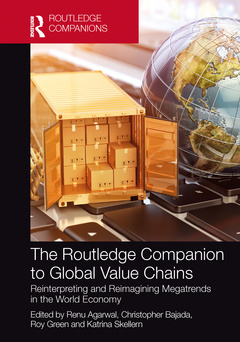Description
The Routledge Companion to Global Value Chains
Reinterpreting and Reimagining Megatrends in the World Economy
Routledge Companions in Business, Management and Marketing Series
Coordinators: Agarwal Renu, Bajada Christopher, Green Roy, Skellern Katrina
Language: English
Subjects for The Routledge Companion to Global Value Chains:
Keywords
Supply Chain; Emerging economies; GVC Participation; Global production chain; Knowledge Spillovers; Supply chain management; Global Supply Chains; Global value chain; Inter-country Input Output; Vice Versa; Supply Chain Visibility; Business Processes; World Input; Output Database; Blockchain Technology; Smart Contracts; Fuzzy Analytic Hierarchy Process; Supply Chain Resilience; Business Ecosystem; RFID; Technological Innovation Systems; IoT; Healthcare Supply Chains; Big Data Analytics; Global Gdp Growth; Global Gdp; Trade Complexes; Sourcing Pathways; Industry Complexes; FTA Preference
Publication date: 05-2023
· 17.4x24.6 cm · Paperback
Publication date: 10-2021
· 17.4x24.6 cm · Hardback
Description
/li>Contents
/li>Readership
/li>Biography
/li>
This Companion provides a review of global value chains (GVCs) and the megatrends that are shaping them and will continue to reshape them in deep-set trajectories of change over the next few decades. Megatrends herald both challenges and opportunities. With the growing interest among business leaders and researchers in GVCs, this is a reference work which fills a gap in current literature by focusing on the new features of GVCs, including the shift of global purchasing power towards developing economies, the significance of emerging technologies and data analytics, the increasing tensions between globalisation and de-globalisation, and the role of micro-multinationals, start-up entrepreneurs, the public sector and middle markets in a fast-changing global economy.
The early chapters are essentially intradisciplinary in character, with the first seeking to explore some historical aspects of GVCs. Subsequent chapters cover the theory and practice of operations and supply chain management, emerging supply chain technologies, and the impact of inter-firm collaboration across sectors and economies. The final chapters take a more interdisciplinary approach and examine topics at the interface of GVCs with the economy, society, culture and politics.
This comprehensive handbook provides a timely analysis of leading-edge global megatrends and practices in one volume.
Part 1 History of Global Value Chains 1. Past, Present and Future Perspectives of Supply Chains Part 2 Global Value Chains: Theory and Practice 2. The use of requisite collaboration to better align and drive value in contemporary value chains3. Dynamic Capabilities for Global Value Chains: From Selection to Deployment 4.Interfirm customer–supplier collaboration for a sustainable transition 5.Climate-Resilient Supply Chains: A Mixed-methods Approach. Case study: Zespri global supply chain integration Part 3 Role of Emerging Technologies and Data Analytics in Global Value Chains 6.Integration of ICT Systems and Processes: Supply Chain, Process Management and Patient Safety with Data Analytics to Enhance Healthcare Delivery7.Blockchain and Allied Technologies for Food Supply Chain Risk Mitigation in Global Value Chains8.Technological Trends and Future Management Practices in Global Value Chains9.Blockchain adoption challenges in Supply Chain.Case study: Internet Of Things (IoT)–Enabled Agri-Food Supply Chain Management: A New Zealand Case Part 4 Megatrends in Global Value Chains 10. Global value chains are not always global – the ‘global factory’ and ‘exo-net’ value architectures11. Linking the interconnectedness and innovativeness of global value chains 12. Maximizing the Developmental Benefits of GVC Integration while Addressing Emerging Challenges13. Regionalism and SMEs: A firm-level perspective on GVCs and FTAs 14. Global Value Chains and Least Developed Countries: Influencing Value Chain Governance and Upgrading Processes 15. Mapping of GVCs, services and intangible assets 16. Global Value Chain at a crossroads: a trade and investment perspective 17. Innovation, industrial strategy and Global Value Chains. Case Study: Meso-level GVC analysis of Korean shipbuilding. Case study: GVC vulnerability to disruption Part 5 Implications 18. Supply Chain Management at an Inflection Point: A final perspective
Renu Agarwal is Associate Professor, Operations and Supply Chain Management, and the Director of Strategic Supply Chain Management Programs at the University of Technology Sydney. Agarwal has extensive industry experience and now provides leadership in the disciplinary fields of service innovation, service value networks, supply chain management, dynamic capability building, management practices, innovation and productivity. Agarwal has undertaken research for many organisations, in particular federal and state governments, and industry groups and associations. Agarwal has published in several edited books and top-tier refereed management journal articles.
Christopher Bajada is Associate Professor of Economics at the University of Technology Sydney. Bajada's research is primarily in applied macroeconomics, with a special interest in management practices, supply chains, tax compliance, circular economy and productivity. Bajada has published widely, including in top-tier journals, research books and academic textbooks. Bajada has undertaken research for many organisations, including federal and state governments, and industry groups and associations.
Roy Green is Emeritus Professor and Special Innovation Adviser at the University of Technology Sydney. Green also chairs the Port of Newcastle and Advanced Robotics for Manufacturing Hub and is a board member of the Innovative Manufacturing Cooperative Research Centre.
Katrina Skellern is a post-doctoral research fellow with the Centre for Business & Social Innovation at the University of Technology Sydney (UTS) Business School. She has over 20 years of experience in project management, policy development, program evaluation, business model innovation, community and stakeholder engagement in Australia and internationally. Skellern is currently working on a business model transformation project with the Innovative Manufacturing Cooperative Research Centre.




